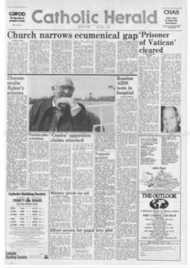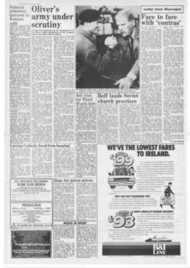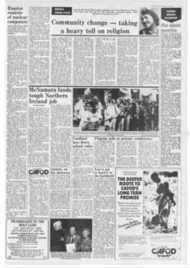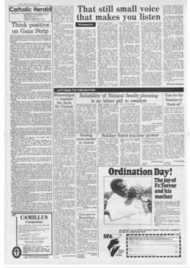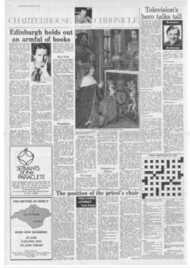Page 3, 24th July 1987
Page 3

Report an error
Noticed an error on this page?If you've noticed an error in this article please click here to report it.
Tags
Share
Related articles
Alton Denies New Movement On Course To Become A Political...
Commons Deny Sex Education Re Privileges
News Analysis
Short-stay Homeless Hostels Face Ruinous Polltax Assessments
Poll Tax Threat Hangs Over Orders
Community change taking a heavy toll on religion
Catholic MP David Alton (right) questioned the Prime Minister on Tuesday ab-nit fears that the poll tax will undermine organised religion. Peter Stanford investigates his fears.
LIES, damn lies and statistics is a well-worn phrase, first coined by Disraeli. I'm sure he would have raised a sartorial eyebrow this week at the veritable deluge of statistics raining in on the head of the already hapless Nicholas Ridley at the Department of the Environment about the government's proposed poll tax and its effect on religious institutions.
The General Synod of the Church of England heard that it will cost their church an estimated £4 million extra per year. A distinguished Catholic organ has put the ecumenical picture at more like £10 million. The fate of individual establishments has been pencilled in by the Liberal's campaigning Chief Whip, David Alton.
Without casting doubt on any of the figures that have been arrived at by any of these sources — which incidentally have made use of the Department of the Environment's own estimates in making any calculations — some of the debate has seemed rather premature to leading church figures.
Although the poll tax plans were announced in the Queen's Speech, legislation — written details of the proposals — will not be presented to Parliament until after the summer recess.
The example of the act bringing Scotland over to a "community charge" obviously is a precedent, but even there the system of exemptions has yet to be worked out fully before the act comes into force in April 1989. These are still being negotiated between government officials and concerned bodies.
Weighing in against this note of caution is a letter from Mrs Thatcher to Dr Graham Leonard, Anglican Bishop of London and chairman of the churches' main committee, in which she wrote: "We have reached the view that there should be no special arrangements for charities as such in the new system".
However, putting that in context, a spokesman for the Department of the Environment pointed out to the Catholic Herald this week that present government proposals would still leave charities with substantial advantages.
At this stage, I fear, it is time to add a few more figures to the equation. Take the example of a charity shop which currently enjoys a mandatory 50 per cent reduction on rates, and discretionary 100 per cent. That shop would under the present plans have to pay a business rate, set at a nationwide level, to the central government coffers at whatever level of exemption it currently enjoys. In areas of high rates, the new national rate level which will apply to all nondomestic properties is likely to be lower. Hence the charity shop might do better financially.
The poll tax is dependent on someone living in a property. Hence in a presbytery which presently pays domestic rates, the new system would substitute a poll tax levied on the number inhabiting the building. In some of the rambling Victorian piles attached to the country's Catholic churches with just one priest floating round inside, the poll tax may well represent a substantial saving.
The real difficulty comes with such institutions as St Joseph's Hospice in Hackney. There the Irish Sisters of Charity have a community of 20 nuns caring for the terminally, ill. The residents of St Joseph's will not be liable to poll tax, and since the building is currently rate exempt, it will remain so for the new national non-domestic rate. Therefore the extra cost will come in with regard to the 20 nuns who also live in the hospice. On calculations by Mr Alton's office, if they pay 100 per cent poll tax at Department of the Environment proposed levels, it will cost the order
£13,820, threatening the very survival of this much praised institution.
However, as the DoE spokesman pointed out, reductions of up to 80 per cent have been muted by ministers, and since the nuns live by their vow of poverty, they will be likely to enjoy the full level of exemption and pay just 20 per cent of Mr Alton's estimate that is £2,764.
Another example quoted by Mr Alton is that of the mother house of the order of the Sisters of Charity of St Paul in Selly Park in Birmingham. There they pay half rates, and hence would be liable to half of the national non-domestic rate. But there would be the added burden of the poll tax on the 40 nuns who look after the sick and infirm and perform other vital tasks in the community. According to Mr Alton's office a full poll tax on the sisters would bring a bill of £18,600 in addition to any rates.
It is such charitable concerns which provide a free service to the community at large that are at the centre of church concerns about government plans. Because they generate no income and just cover their costs, any additional poll tax burden even if it be at a reduced level, would prove hard to meet. Equally contemplative communities whose activities and prayer do not generate any funds would find it hard to pay a poll tax on the members of their enclosed communities.
The Catholic bishops of England and Wales are known to be considering the situation very carefully and will await the publication of the draft legislation before making representations to ministers.
However, already there is a general principle involved in the whole poll tax debate that is causing much concern in church circles. The poll tax will essentially be a uniform tax that will be initially levied on all at the same level. Although reductions and exemptions will be added for the low paid, it is at heart a tax that takes no concern of ability to pay. Hence one person with an enormous bank balance living in a stately home will pay the same in principle as an eighteen-year-old living at home with his or her family and just starting a first job.
David Alton is among opposition leaders — and even some back bench members of Mrs Thatcher's own government — who are pressing for a rethink on the matter. All are agreed that the rating system is in need of overhaul, but many favour a form of local income tax that would take into account the ability to pay.
The campaign against the community charge — described by the Prime Minister recently as the main aim of this her third government — is gathering momentum and religious communities and their fate is at the forefront of the struggle.
For the time being senior Catholic figures are keeping silent publically on the matter, but David Alton's warning that the proposals "will undermine organised religion in this country" will certainly keep them on their toes in the months ahead.
blog comments powered by Disqus


